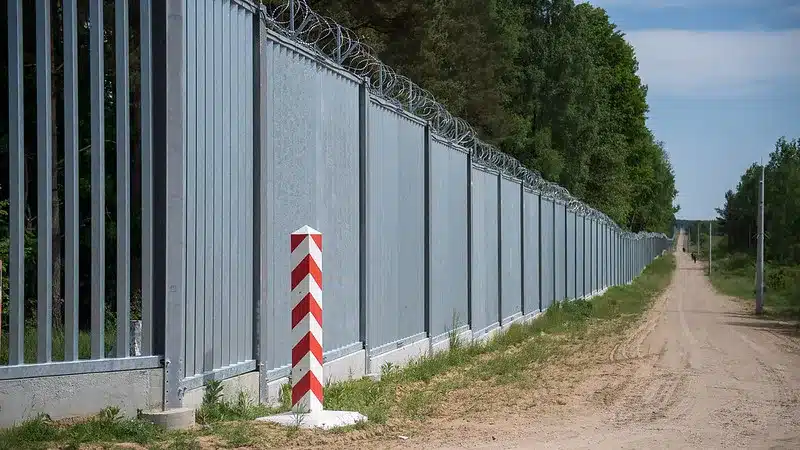After nearly 90 days of the buffer zone’s operation at the Polish-Belarusian border, the number of attempts to illegally cross the border has decreased by 64%, which confirms the necessity and effectiveness of the zone’s actions. As a result, the Minister of the Interior and Administration has signed a regulation extending the temporary ban on staying in the designated area within the border zone adjacent to the state border with the Republic of Belarus for another 90 days. The regulation will take effect on Wednesday, September 11th.
“The zone has delivered concrete, positive results. It is primarily aimed at human traffickers who smuggle people across the border,” said Minister Tomasz Siemoniak, justifying the decision to extend the buffer zone.
There is growing migration pressure at the Polish-Belarusian border, which is artificially fueled by the authorities in Minsk. This is part of hybrid actions aimed at destabilizing Poland and other EU member states. Polish authorities are taking specific measures to counteract this phenomenon. One result is the extension of the temporary ban on staying in the designated area within the border zone adjacent to the state border with Belarus.
The number of attempts to illegally cross the border has decreased by 64%.
The regulations in force so far have shown that the buffer zone is fulfilling its purpose. The number of illegal attempts to enter Poland has significantly decreased. The temporary ban on staying in the designated area within the border zone adjacent to the state border with the Republic of Belarus has been in effect since June 13th.
During this time – from June 13th to September 9th – the Border Guard recorded 6,130 attempts to illegally cross the border. In the corresponding period before the zone was established, there were 17,030 such attempts, marking a 64% reduction in illegal border crossings.
Moreover, from June 13th to September 9th, officers of the Podlasie Border Guard Branch arrested a total of 71 couriers across the entire area.
Access to the zone for media representatives
So far, the Border Guard has issued 158 permits to stay in the buffer zone, including 97 permits granted to media representatives. The highest number of permits were issued for Białowieża (66) and Dubicze Cerkiewne (44).
Twenty-three permits were issued to representatives of an international non-governmental organization, and 9 permits to the Regional Directorate of State Forests.
The extent of the zone is minimized
The previous regulation by the Ministry of the Interior and Administration introduced a temporary ban on staying in a designated area within the border zone adjacent to the state border with Belarus, effective from June 13th to September 10th, 2024. The new regulation extends this ban for another 90 days. The area covered by the ban will remain unchanged compared to the area specified in the current regulation.
The prohibited zone covers a 60.67 km section of the border, within the territorial reach of the Border Guard stations in Narewka, Białowieża, Dubicze Cerkiewne, and Czeremcha.
Along a 44.55 km section, the restricted area extends 200 meters from the state border line. In contrast, along a 16.12 km section located near nature reserves, the zone will be wider, reaching about 2 km.
As a rule, the zone does not include towns or tourist routes. The goal is to minimize the impact of the restrictions on residents, tourists, and other entities conducting business.
Safety of officers and soldiers
The introduced measures not only ensure the inviolability of the state border but also, by limiting the presence of unauthorized persons in the area of official operations, guarantee the safety of both bystanders and officers and employees of the Police, Border Guard, and soldiers.
The buffer zone also restricts the activities of smuggling groups that facilitate illegal migration. Additionally, it is crucial for the work related to the modernization of the permanent barrier and the electronic fence.
Extending the ban on staying in the area adjacent to the state border will have a positive impact on the safety of representatives and employees performing technical work, as well as bystanders who may find themselves in this region. This also fulfills Poland’s international obligations.
